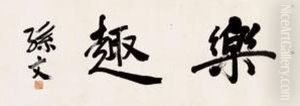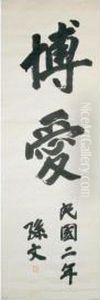Sun Zhongshan Paintings
Sun Zhongshan, better known in the Western world as Sun Yat-sen, was not an artist in the traditional sense of painters or sculptors, but he was a revolutionary leader, politician, and a physician who is considered the founding father of the Republic of China (ROC). Sun Yat-sen was born on November 12, 1866, in the village of Cuiheng, Xiangshan County (now part of Zhongshan City), Guangdong Province, China.
Sun was educated in Hawaii and later attended medical school in Hong Kong, becoming a Christian during his time there. He was deeply affected by the weakness of the Qing Dynasty and the encroachment of foreign powers into China, which led him to pursue political change rather than a medical career. Sun Yat-sen played a pivotal role in overthrowing the Qing Dynasty, the last imperial dynasty of China, which led to the establishment of the Republic of China in 1912.
He was the first provisional president when the Republic of China was founded in 1912 and later co-founded the Kuomintang (KMT), or Nationalist Party of China, serving as its first leader. Sun's political philosophy, known as the Three Principles of the People, advocated for nationalism (independence from foreign domination), democracy, and the people's livelihood (economic security and well-being).
Despite his pivotal role in the revolution, Sun's political life was fraught with challenges. He faced opposition from rival warlords and was in a constant struggle to unify China under the Republic. Sun Yat-sen spent much of his life in exile, garnering support for his revolutionary ideas and seeking assistance from foreign governments.
Sun Yat-sen died of cancer on March 12, 1925, in Beijing, China. His legacy is celebrated in both the People's Republic of China and Taiwan for his efforts to modernize China and his commitment to the Chinese people. He is remembered as a national hero, and numerous monuments and institutions in China are dedicated to his memory. His former residence and presidential office in Nanjing have been preserved as museums, and his mausoleum in Nanjing is a site of pilgrimage for many Chinese people. Although his dream of a unified, democratic, and prosperous China was not fully realized in his lifetime, Sun Yat-sen's vision continues to influence Chinese politics and society.

